 |
 |
|
Inexpensive Treatments for Hoof Diseases in Horses That Really Work
Ray Tricca, SBS EQUINE co-founder
Beware of the Quick-Fix!
After 35 years in the hoof care business, I have learned that the first line of defense against hoof disease is usually your
farrier. When identified, many horse owners expect their farrier to do a quick-fix on a suspected hoof infection as a part of
their routine trimming and shoeing. However, most of the hoof care professionals that I know have provided sound advice in
the form of an Action-Plan for dealing with these issues. The reality is that deeply rooted infections such as white line disease
and chronic thrush are nearly impossible to eradicate with one application of any topical agent.
Bacteria and fungi are very adept at hiding among healthy hoof tissue through millions of years of evolution. One application
of a robust chemical agent usually will not stop them. Unless you can get to the infection early enough, repeated use of these
chemical agents can be counterproductive. Caustic chemicals can be effective against bacteria and fungi, but their continued use can be harmful to surrounding healthy hoof tissue and slow the healing process.
An Action-Plan That Works
When a hoof disease is identified, the horse owner or handler should share the responsibility for the follow-up treatment in
between farrier appointments. Your farrier or vet’s recommendations on what topical agents to use and how frequently they should be applied are essential to a successful Action-Plan.
Removing diseased tissue and trimming the flaps of the frog are critical first steps to be done by the farrier. Trimming opens
up the hooves to oxygen which gives a head start to the healing process. Improperly trimmed feet prevent oxygen or topical ingredients from entering the crevices where the disease usually progresses.
The horse owner should ensure that the feet are cleaned regularly by washing, picking & brushing with a good hoof pick.
Most professional farriers recommend well-established commercial preparations for treatments that are known to be safe
and effective against hoof disease. They know that home remedy recommendations, no matter how well-intended, can be
dangerous and lead to permanent damage to the hoof structure, and lead to possible litigation if the home remedies prove damaging.
Hoof researchers have discovered that there are many economical hoof treatments that can stop bacteria and fungi without
harming sensitive hoof tissue. Most pharmaceutical strength formulas that are sold commercially are not harsh or harmful to
hoof tissue when used as directed. This means that they can be used more frequently than caustic home ingredients.
This keeps the infections under control and healthy hoof tissue a chance to grow-out and prosper as nature intended. Do not
expect to kill all the dangerous organisms initially. Consistent use of an eco-friendly commercial product can slow disease
advancement to the point where it may grow out with successive trimmings by the farrier.
Common Hoof Problems & Solutions Recognized by Hoof Care Professionals
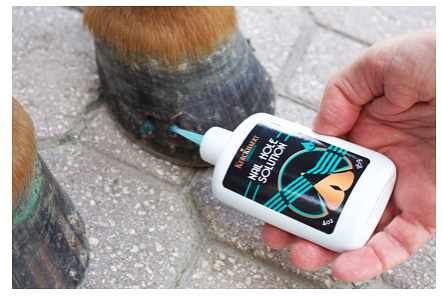 |
NAIL HOLES - Nail holes constitute a significant pathway for infection. Modern nail hole treatments should provide three
functions - seal out external contaminates, clean and disinfect the nail hole, and repair and close holes & small cracks from
the inside out. Sealants are now available containing natural protein collagen and biocides that clean and disinfect nail holes and close the opening.
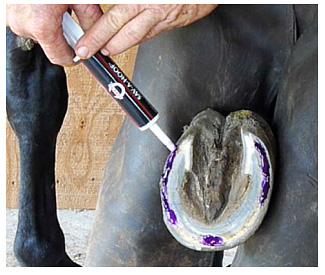 |
WHITE LINE - Some medical gel preparations have complex time-release formulas that gradually absorb their critical
ingredients into the affected tissue. These gel formulas are successful in their ability to stop deeply rooted bacteria and fungal
spores due to the extended contact time they provide inside the hoof cracks & voids versus liquid preparations.
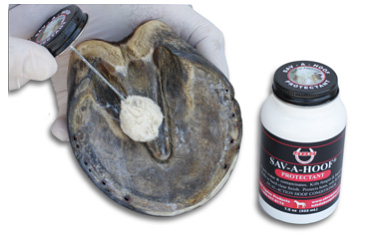 |
SOLE & FROG - Dual-action hoof conditioners that contain natural protein emulsions provide an effective barrier against
bacteria & fungi by repelling external moisture and contaminates. They also help rejuvenate frog function to improve blood
flow. Other ingredients absorb into hoof tissue to fight infection. Excellent for extremely wet or dry conditions. Apply to the entire hoof capsule: horn, sole, and frog.
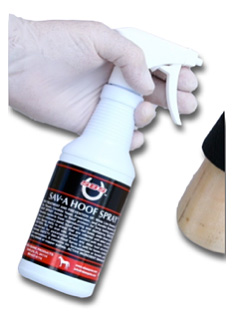 |
HOOF WALL - Hoof researchers have introduced safe and effective topical spray treatments for the hoof wall, sole, and
frog. They are used for prevention and early intervention—ingredients bond to hoof protein and form an antiseptic barrier
against infection for long-lasting protection. The hoof's diseases include white line disease, seedy toe, thrush, stubborn candida yeast, fungus, mold, anaerobic and aerobic bacteria.
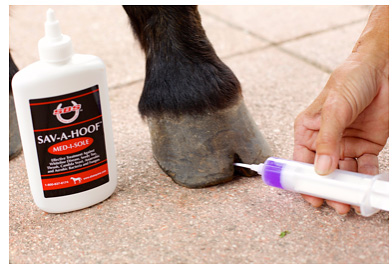 |
TOE & HEELS - Infections in toes and heels can be severe and progress rapidly if not treated quickly. These areas can be
treated easily by handlers with either medical gels or liquid formulas using syringes, sprayers, daubers, brushes, squeeze bottles, or soaking boots. Treat after daily grooming or as directed by the farrier.
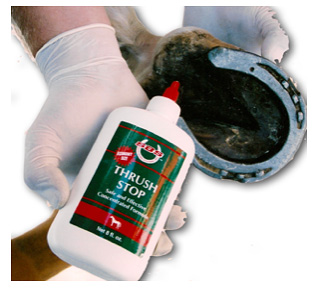 |
FROG CLEFTS - After routine trimming by the farrier, frequent picking and brushing by the horse owner are critical steps
for preventing or treating thrush in the clefts of the frog. Avoid using household caustic chemicals, which can delay the
healing process. Use proven gel or liquid commercial preparations with a successful track record at defeating thrush without harming healthy hoof tissue.
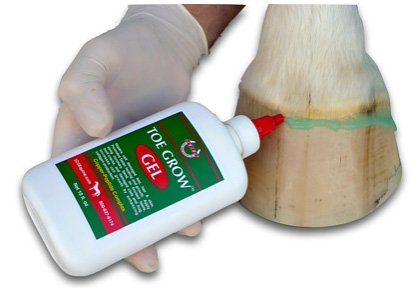 |
CORONET BAND - The Coronary band is the soft skin that the horse's hoof grows from… just like the cuticles on our
fingers. There are copper-peptide remedies available that improve hoof growth and repair cell damage by stimulating blood
flow and collagen production. There are specific commercial topical products that are effective for white line disease and
abscess exits. Some of these products travel down the horn tubules, which are open at the hairline.
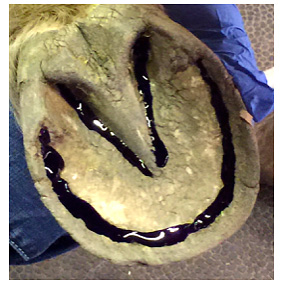 |
Summary - The Future of Hoof Care is Here
When a hoof problem has been observed, the farrier and horse owner should establish a Game Plan for early intervention.
The Game Plan should include a weekly maintenance schedule and product recommendations for early treatment.
Stain-marking gel products are gaining in popularity. They turn diseased hoof tissue a dark blue color. The stain shows
where to add more gel as the color fades. Gel products are used frequently along the horn rim, in voids, nail holes, under shoes, and pads.
These time-release gel formulas are longer lasting than liquids and improve the critical contact time that is needed to affect
the fungal spores within the sulcus of the frog and white line area without running off.
Visit SBS EQUINE.COM when searching for information and helpful articles about hoof care or treating hoof disease.
|
 |
 |
|
To advertise your horse product or service, Contact Ann
|
 |
 |
|
InfoHorse.com, Horse Information Lives Here ®
2/23/2026
Contact Us to Advertise to over a million Horse Owners.
All images and content Copyright© 2021 by InfoHorse.com,
|
 |
 |
|
Articles, Academic Schools, Arena Maintenance, Animal Communicators, Barns, Barn and Accessories, Barn Equipment and Tractors, Breast Collars, Grooming Products for Horses, Hay Feeders, Horse Blankets, Horse Breeders, Horse Camping Gear, Career Schools, Horse Training Clinicians, Equestrian Clothing, Dogs and Puppies, Horse Fencing, Horse Products For Sale, Fly Control, Foal Care, Horse Footings, Horse Gifts, Horse Health and Nutrition, Hoof and Leg, Horse Insurance, Certified Trainers, Equine Lawyers, Leather Care, Links , Portable Horse Stalls, Arenas and Roundpens, Horse Riding Schools, Horse Schools, Safety Products, Services for Horses, Horse Trailers, Horse Shipping, Horse
Skin Coat Care, Specialty Trainers, Horse Summer Camps, Tack, Horse Trainers, Treats and Snacks, Truck Accessories, Trucks, Horse Vacations, Western Lifestyle
|
|